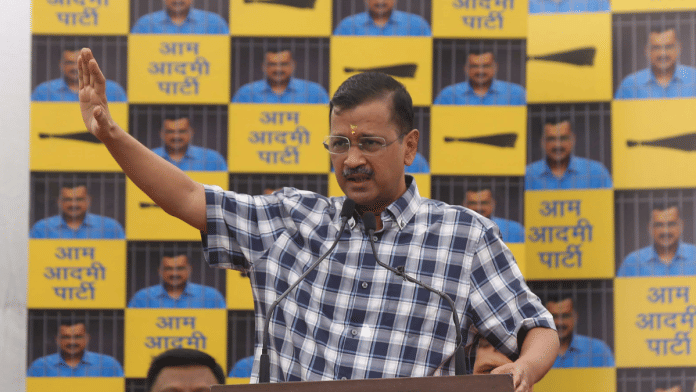New Delhi: The Delhi High Court Friday stayed the operation of the trial court order granting bail to Delhi Chief Minister Arvind Kejriwal till it finally decides on the Enforcement Directorate’s (ED’s) application seeking a stay.
Justice Sudhir Kumar Jain said he was reserving his order on the ED’s stay application for two to three days, and would announce it by early next week. He also issued notice on the appeal filed by the ED challenging Kejriwal’s bail in the Delhi excise policy case.
Kejriwal was arrested in the case on 21 March. He was granted bail briefly by the Supreme Court on 10 May till 1 June, to campaign for the Lok Sabha elections. He was given bail by Vacation Judge Niyay Bindu late Thursday evening but the ED was quick to challenge this order in the Delhi High Court, and made an urgent mention this morning before it.
Arguing for the ED Friday, Additional Solicitor General S.V. Raju made a three-pronged submission. He submitted that the trial court judge’s order did not satisfy the twin considerations under Section 45 of the Prevention of Money Laundering Act 2002. The provision states that bail can be granted to an accused in a money laundering case only if two conditions are satisfied — there should be prima facie satisfaction that the accused had not committed the offence, and they are not likely to commit any offence while on bail.
Raju also alleged he was not given fair opportunity to present the prosecution side, and that the trial court’s order had taken “irrelevant” aspects into consideration to grant Kejriwal bail. “There can’t be a better case for cancellation of bail than this one,” he asserted.
He took objection to the fact that the judgment said, “It is not possible to go through these thousands of pages of the documents at this juncture but this is the duty of the court to work upon the matter whichever comes for consideration and pass the order in accordance with the law.”
Raju then asserted that “there can’t be a greater perversity” than this, when a judge admits that they have not read the papers.
“What type of an order is this?” he asked, while clarifying that he was only arguing in the application for stay of the bail. He also took exception to the bail order which said the ED had failed to provide direct evidence against Kejriwal, highlighting the statements of various witnesses against the Delhi chief minister.
On the other hand, Senior Advocate Abhishek Manu Singhvi, arguing for Kejriwal, asserted that it was “extremely unfortunate” that ASG Raju had “maligned” the judge who granted Kejriwal bail. This whole approach is “completely deplorable”, he submitted, adding that “statutory objectivity” had been lost as far as the ED was concerned.
Singhvi pointed out that before judge Niyay Bindu — who granted Kejriwal bail — the ED had argued for over three hours. He then highlighted the difference between the grant of bail and the cancellation or reversal of bail. “They are two totally different genus,” he explained.
He asserted that the threshold for cancellation of bail which has been granted by a competent court is higher, and asserted that the trial court considered all aspects raised by ED in its order.
Also read: Meetings in jail or constitutional crisis? Kejriwal’s arrest raises questions about who’ll run Delhi
‘Investigation is an art’
While granting bail to Kejriwal, vacation judge Bindu of Rouse Avenue Court had observed that the ED failed to give any direct evidence against the chief minister over the proceeds of crime.
The court also took objection to the ED’s argument that “investigation is an art and sometimes one accused is given lollypop of bail and pardon and induced with some assurance to make them tell the story behind the offence”.
The judge observed, “The court has to take a pause to consider this argument which is not a potable submission that investigation is an art because if it is so, then, any person can be implicated and kept behind the bars by artistically procuring the material against him after artistically avoiding/withdrawing exculpatory material from the record.”
It then asserted, “This very scenario constrains the court to draw an inference against the investigating agency that it is not acting without bias.”
The judge then ordered Kejriwal’s release on a bail bond of ₹1 lakh.
The ED then approached the high court, challenging the bail. The court halted Kejriwal’s release Friday morning, and then heard the submissions by ED and Kejriwal’s lawyers.
(Edited by Tikli Basu)
Also read: ‘Delay on part of accused, not prosecution’ — what court said in rejecting Umar Khalid’s bail plea






